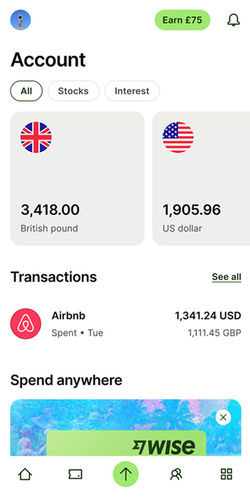Compare all the best ways to send money to Spain
Wise is the overall best way for sending EUR from abroad, appearing 100% of the time in our searches for EUR transfers.
They charge $27.22 in fees (based on $7,000 transfer) and add 0.11% markup to the EUR exchange rate.
For more details on EUR transfers, keep reading.
We’ll give you the best, fastest, and cheapest options, provide you with expert tips, EUR transfer deals, and explain everything you need to know about money transfers to Spain.
Send money to Spain
"Over 16 million customers use Wise, mostly for their excellent mobile app, transparent fee structure & use of mid-market rates. Now increasingly used for larger transfers."
"Over 16 million customers use Wise, mostly for their excellent mobile app, transparent fee structure & use of mid-market rates. Now increasingly used for larger transfers."
"Over 16 million customers use Wise, mostly for their excellent mobile app, transparent fee structure & use of mid-market rates. Now increasingly used for larger transfers."
"Xe has over 30 years of currency exchange experience, and is one of the most reputable names on the market. 200 countries, 100 currencies, & funds often received in seconds."
"Xe has over 30 years of currency exchange experience, and is one of the most reputable names on the market. 200 countries, 100 currencies, & funds often received in seconds."
"Xe has over 30 years of currency exchange experience, and is one of the most reputable names on the market. 200 countries, 100 currencies, & funds often received in seconds."
"Over 16 million customers use Wise, mostly for their excellent mobile app, transparent fee structure & use of mid-market rates. Now increasingly used for larger transfers."
"Over 16 million customers use Wise, mostly for their excellent mobile app, transparent fee structure & use of mid-market rates. Now increasingly used for larger transfers."
"Over 16 million customers use Wise, mostly for their excellent mobile app, transparent fee structure & use of mid-market rates. Now increasingly used for larger transfers."
"Currencies Direct have over 30 years of global money transfer expertise. Award winning service with a TrustPilot rating of 4.9. Lock-in rates for the future or trade 24/7 on web or mobile."
"Currencies Direct have over 30 years of global money transfer expertise. Award winning service with a TrustPilot rating of 4.9. Lock-in rates for the future or trade 24/7 on web or mobile."
"Currencies Direct have over 30 years of global money transfer expertise. Award winning service with a TrustPilot rating of 4.9. Lock-in rates for the future or trade 24/7 on web or mobile."
"Revolut has 50+ million customers globally. You can hold up to 36 currencies in the app and send money quickly in 70+ currencies to 160+ countries."
"Revolut has 50+ million customers globally. You can hold up to 36 currencies in the app and send money quickly in 70+ currencies to 160+ countries."
"Revolut has 50+ million customers globally. You can hold up to 36 currencies in the app and send money quickly in 70+ currencies to 160+ countries."
"Key Currency offers a personal service with a dedicated account manager. There are no transfer limits or fees which is perfect for larger send amounts."
"Key Currency offers a personal service with a dedicated account manager. There are no transfer limits or fees which is perfect for larger send amounts."
"Key Currency offers a personal service with a dedicated account manager. There are no transfer limits or fees which is perfect for larger send amounts."
"Xe has over 30 years of currency exchange experience, and is one of the most reputable names on the market. 200 countries, 100 currencies, & funds often received in seconds."
"Xe has over 30 years of currency exchange experience, and is one of the most reputable names on the market. 200 countries, 100 currencies, & funds often received in seconds."
"Xe has over 30 years of currency exchange experience, and is one of the most reputable names on the market. 200 countries, 100 currencies, & funds often received in seconds."
"OFX have been helping individuals and businesses send money for over 25 years. Transfer in 50+ currencies to 170+ countries, with 24/7 phone access to currency experts."
"OFX have been helping individuals and businesses send money for over 25 years. Transfer in 50+ currencies to 170+ countries, with 24/7 phone access to currency experts."
"OFX have been helping individuals and businesses send money for over 25 years. Transfer in 50+ currencies to 170+ countries, with 24/7 phone access to currency experts."
"Regency's UK-based account management team has vast experience. Get support on all kinds of transfers, from overseas property transactions to business payments & more."
"Regency's UK-based account management team has vast experience. Get support on all kinds of transfers, from overseas property transactions to business payments & more."
"Regency's UK-based account management team has vast experience. Get support on all kinds of transfers, from overseas property transactions to business payments & more."
"Currencyflow is a modern FX broker backed by industry veterans with 30+ years of currency trading experience. Contact the UK-based team for a free quote."
"Currencyflow is a modern FX broker backed by industry veterans with 30+ years of currency trading experience. Contact the UK-based team for a free quote."
"Currencyflow is a modern FX broker backed by industry veterans with 30+ years of currency trading experience. Contact the UK-based team for a free quote."
"Remitly focuses on sending money to friends and family in Asia, Africa and South America. Wide coverage and well-suited to regular transfers home."
"Remitly focuses on sending money to friends and family in Asia, Africa and South America. Wide coverage and well-suited to regular transfers home."
"Remitly focuses on sending money to friends and family in Asia, Africa and South America. Wide coverage and well-suited to regular transfers home."
"Lumon has cared for over 69,000 customers since 2000. Get support for larger transfers from dedicated currency specialists."
"Lumon has cared for over 69,000 customers since 2000. Get support for larger transfers from dedicated currency specialists."
"Lumon has cared for over 69,000 customers since 2000. Get support for larger transfers from dedicated currency specialists."
"Xoom, a PayPal service, allows you to send money in more than 160 countries. You can send cash for over-the-counter pickup or home delivery, as well as send by bank transfer or debit card."
"Xoom, a PayPal service, allows you to send money in more than 160 countries. You can send cash for over-the-counter pickup or home delivery, as well as send by bank transfer or debit card."
"Xoom, a PayPal service, allows you to send money in more than 160 countries. You can send cash for over-the-counter pickup or home delivery, as well as send by bank transfer or debit card."
"Securely send money to and from 150+ countries and 20+ currencies. Same-day transfers avaialble on most major currencies."
"Securely send money to and from 150+ countries and 20+ currencies. Same-day transfers avaialble on most major currencies."
"Securely send money to and from 150+ countries and 20+ currencies. Same-day transfers avaialble on most major currencies."
"Fast, secure internatinal transfers with no fees and transparent rates. They offer a free currency card for use at home and abroad."
"Fast, secure internatinal transfers with no fees and transparent rates. They offer a free currency card for use at home and abroad."
"Fast, secure internatinal transfers with no fees and transparent rates. They offer a free currency card for use at home and abroad."
"Paysend has transparent fees and rates, with transfer sent within seconds to your recipient's bank. They also have global 24/7 support for any enquiries, and bank-level security."
"Paysend has transparent fees and rates, with transfer sent within seconds to your recipient's bank. They also have global 24/7 support for any enquiries, and bank-level security."
"Paysend has transparent fees and rates, with transfer sent within seconds to your recipient's bank. They also have global 24/7 support for any enquiries, and bank-level security."
"Moneycorp is an established player in the market, with a focus on private clients and corporates. Make overseas payments in over 120 currencies and 190 countries."
"Moneycorp is an established player in the market, with a focus on private clients and corporates. Make overseas payments in over 120 currencies and 190 countries."
"Moneycorp is an established player in the market, with a focus on private clients and corporates. Make overseas payments in over 120 currencies and 190 countries."
"Moneygram is a well established service with over 80 years in the sector. They support over 200 countries worldwide and have over 440,000 retail locations."
"Moneygram is a well established service with over 80 years in the sector. They support over 200 countries worldwide and have over 440,000 retail locations."
"Moneygram is a well established service with over 80 years in the sector. They support over 200 countries worldwide and have over 440,000 retail locations."
How to get the best rate when sending money to Spain
Always compare rates
Don't pay more than you have to. Use our live comparison tool to make sure you aren't missing the best rates on EUR transfers.
Choose a provider
Select the provider that offers you the most EUR and fits your transfer needs.
Click, sign up & send
Follow the steps & make your transfer. Your transfer to Spain will soon be on its way.
We found Wise to be the best way to send money to Spain.
After testing and reviewing 16 money transfer providers servicing Spain, Wise came out on top.
Wise offers quick transfers, adds a 0.11% markup on EUR transfers, and costs $27.22 in fees.
This makes it the best option for a mix of cost, speed & features for EUR transfers.

Key Currency is the cheapest way to send money to Spain
Key Currency charges $0 per transfer and adds a 0.25% markup on top of the Euro exchange rate.
bank transfer is the cheapest funding option when sending money to Spain. Pair it together with Key Currency, to get the most out of your EUR transfer.

Currencyflow is the fastest way to send money to Spain
With Currencyflow, the transfer time to Spain is minutes - 24 hours.
charges $0 and adds a markup of 0.26% on top of the EUR exchange rate. This is 0% cheaper than the next best option as of January 2026.
For the best combination of speed and cost, we recommend using a to fund your transfer to Spain.
*This is based on a $7,000 transfer to Spain.

The easiest way to send money to Spain: Wise
They’re highly transparent with fees, charging $27.22 per transfer with a 0.11% markup on the EUR mid-market rate.
With multiple deposit and withdrawal options and reliable customer service, getting started with Wise takes less than 10 minutes, making it a fast, cheap, and user-friendly option.

Consider this before sending money to Spain
If you're sending money to Spain for family, property purchases, retirement support, or daily expenses, it’s important to compare your options.
Costs can vary depending on the method, provider, amount sent, and your location.
We analyzed 16 major money transfer services.
Based on our data:
Key Currency is the cheapest
Currencyflow delivered the fastest times
Wise offered the best EUR exchange rates
Avoid settling for the most popular brand, compare for the best results.
Sending large amounts of EUR to Spain
Wise consistently ranked as the top choice for large EUR transfers. They charge $27.22 per transfer to Spain and apply only a 0.11% markup on the EUR exchange rate.
Whether you’re purchasing property, paying tuition fees in EUR, planning a wedding in Spain, or making business payments, Wise ensures a smooth and secure process.
When sending large amounts of Euro to Spain, consider factors like transfer limits, markup on the EUR rate, customer service, and any legal, tax, or government-imposed restrictions in Spain.

Understand the costs of money transfers to Spain
The cost of sending EUR depends on where you're sending from, the amount of EUR sent, deposit and delivery methods, transfer fees, and the markup applied to the EUR mid-market rate.
For example, if you're transferring $7,000 from the US to Spain, you can expect the following:
Transfer fees to Spain
Depending on the service you use to send Euros, transfer fees can be percentage-based, fixed, or a combination of both.
Key Currency charges only $0 per transfer based on our analysis of 16 services supporting EUR transfers in January 2026.
Markup on EUR exchange rate
A markup is a percentage added to the EUR mid-market rate by a money transfer service (or a bank).
Wise offers the best EUR exchange rates by applying a 0.11% markup on the USD-EUR rate. This means for every US Dollar sent, you receive 0.8502 EUR minus 0.11% deducted from it.
Funding transfer to Spain
How you fund your transfer to Spain can impact the cost:
Bank transfers typically have the lowest fees, often costing up to $0 per transfer.
Debit cards may cost up to $0 per transfer.
Credit cards may come with cash advance fees and increased rates.
Overall, bank transfer is the cheapest funding method for EUR transfers.

Getting the best EUR rate when sending money to Euro
The exchange rate is the value of the Euro (EUR) compared to other currencies. Since it consistently moves up and down, sending at the high will give your receiver more EUR compared to the low.
In the past 7 days, the EUR exchange rate reached:
An average rate of 0.8502 Euro per US Dollar
A high of 0.8523 EUR per USD
And a low of 0.8485 EUR per US Dollar
The EUR/USD exchange rate has seen some movements. Making a transfer when the rate is close to 0.8523 EUR/USD will result in more EUR received.
Wise is our top recommendation for sending Euro, offering a markup of 0.11% which is 0% better than the next cheapest option.
Get notified when it’s the best time to transfer Euros
Sign up for our rate alerts, and we’ll notify you when it’s the best time to send EUR!
Top payment methods to use for transfers to Spain
Money transfer companies will offer different ways to fund your transfer to Spain. Depending on the service used, deposit options can affect the speed, the cost of your transfer, and the amount of EUR received.
Bank transfers
Bank transfers are a standard deposit method used for sending money to Spain. Almost all services covering Spain offer it.
Bank transfers to Spain are usually cheaper than other deposit methods but can take up to 3 business days for EUR to reach Spain.
Out of 16 providers we’ve tested, we found Key Currency to be the cheapest for bank deposits, with just $0 per transfer and a 0.25% markup. This is 0.01% cheaper than the second-best option.
When possible, avoid using wire transfers over the SWIFT network for EUR transfers. It is slower and more expensive due to intermediaries involved, instead, look for an ACH deposit option.

Debit and prepaid cards
Debit card transfers to ES are usually faster than bank transfers.
Most EUR transfers can take up to a few hours but it can be slightly more expensive.
We recommend using Paysend if you want to use a debit card or prepaid card to fund your money transfer to Spain.
With Paysend, you can expect to pay $0 in fees and 1.52% markup when depositing money with a debit card. This is 0.89% cheaper than using the next best provider out of the 16 companies supporting EUR transfers we’ve tested.

Credit cards
You can also use a credit card to fund your transfer to Spain.
We found a few options for credit card transfers out of 16 companies compared.
Credit card deposits are usually more expensive when sending money to Spain, so if you can, use a bank transfer or debit card deposits so save on fees.
If you do need to make a CC deposit, we recommend running a .
Cash advance alert
Your credit card company may charge you a cash advance fee and offer higher interest rates for international transactions to ES. We recommend avoiding credit cards, and instead opt for a bank or debit card transfer.

How we analyze the market
We track the cost, speed, and product offerings of the leading money transfer services available in Spain.
Our comparison engine and algorithms evaluate providers based on over 25 factors, including transfer fees, ease of use, exchange rates, mobile apps, transfer times & customer support.
We also consider how these services are rated on platforms like TrustPilot, AppStore, and Google Play, giving you a comprehensive view of what to expect.
This thorough analysis helps you get the best available deal - every time you want to move money to Spain.
We also provide unbiased and detailed reviews of all the top money transfer companies. You can use these reviews to find the best service for your needs when sending money to Spain
For a deeper understanding of our commitment to integrity and transparency, we invite you to read our editorial policy and review methodology.

Related transfer routes
Send money from Spain
Send money to Spain
FAQs
Find answers to the most common questions on our dedicated FAQ page.
Are there any limits when sending EUR?
Are there any tax implications on EUR transfers?
What are the fees and exchange rates?
How long does it take to transfer money to Spain?
Can I schedule regular payments to Spain?
What currency is used in Spain?
Can I send EUR from any country?
What should I do if something goes wrong with my transfer to Spain?
Can I just wire money to Spain with my bank?
Can I use MoneyTransfers.com to transfer money?
Tools & resources
Contributors







.svg)
















